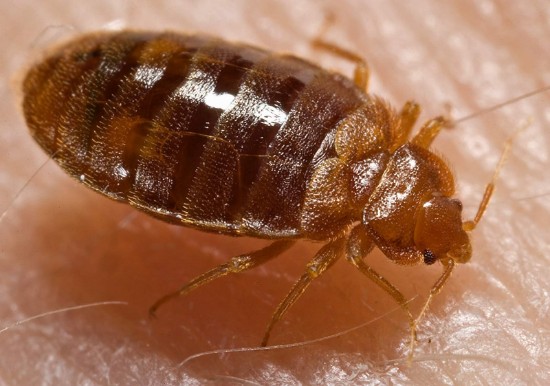Bed Bugs
 Lorain County Public Health gives people advice to help them control bed bug infestations. Bed bugs bite humans but do not spread disease. In order to prevent bed bugs - carefully check clothes and baggage, especially after traveling. Also inspect beds, sheets, blankets, and furniture for signs of bed bugs. Vacuum the mattress and bedroom floors often, and wash bedding often.
Lorain County Public Health gives people advice to help them control bed bug infestations. Bed bugs bite humans but do not spread disease. In order to prevent bed bugs - carefully check clothes and baggage, especially after traveling. Also inspect beds, sheets, blankets, and furniture for signs of bed bugs. Vacuum the mattress and bedroom floors often, and wash bedding often.
What are bed bugs?
Bed bugs are small, flat, insects that feed on the of people and animals. Bed bugs are reddish-brown in color and do not have wings. They range in size from a grain of sand to an apple seed, and they can live several months without eating.
Where are bed bugs found?
Bed bug infestations usually happen around or near the areas where people sleep, including couches and recliners. Bed bugs have been found in residential homes as well as apartments, shelters, rooming houses, hotels, cruise ships, buses, trains, and dorm rooms. They hide during the day in places like seams of mattresses, box springs, bed frames, headboards, dresser tables, inside cracks or crevices, behind wallpaper, or any in other clutter or objects around a bed. Bed bugs can travel over 100 feet in a night but tend to live within 8 feet of where people sleep.
Do bed bugs spread disease?
Bed bugs do not spread disease. Bed bugs can be annoying because their bites might make you itch. Sometimes itching the bites too much can cause a skin infection.
How might bed bugs affect my health?
A bed bug bite affects each person differently. Some people have no sign of a bite, some get a small bite mark, and some have a serious allergic reaction. Bed bugs are not considered dangerous. If you have an allergic reaction to several bites, you may need medical attention.
What are the signs of a bed bug infestation?
One of the easiest ways to identify a bed bug infestation is if someone has bite marks on the face, neck, arms, hands, or any other body parts after sleeping. However, these bite marks may take as long as 14 days to show up in some people. Look for other clues to see if bed bugs have infested an area:
- Bed bug exoskeletons (skins they shed, like a snake)
- Bed bugs in the fold of mattresses and sheets
- Rusty-colored blood spots from bed bug poop on the mattress or nearby furniture
- A sweet, musty odor
How do I know if I’ve been bitten by a bed bug?
You may not know if you’ve been bitten by a bed bug. Some signs include:
- Bite marks like one from a mosquito or a flea -- a slightly swollen and red area that may itch and be irritating
- Insomnia
- Anxiety
- Skin problems from scratching the bites
Some people may be allergic to bugs. These allergic symptoms can include:
- Bigger bite marks
- Painful swellings at the bite site
- Anaphylaxis (reaction that may involve swelling in the throat)
How did I get bed bugs?
People sometimes spread bed bugs when they travel. They may not realize they’re spreading bed bugs because bed bugs are very good at hiding.
Who is at risk getting bed bugs?
Anyone who:
- Visits an infected place
- Travels often
- Shares living and sleeping space where other people have previously slept
How are bed bugs treated and prevented?
To treat bites, avoid scratching the area and apply antiseptic creams or lotions and take an antihistamine.
If you suspect that you have an infestation, contact your landlord or a professional pest control company that is experienced with treating bed bugs. The best way to prevent bed bugs is for the signs of an infestation often.
For advice on locating or treating bed bugs, contact LCPH at 440-322-6367.






